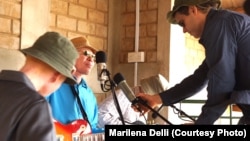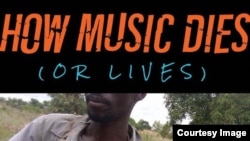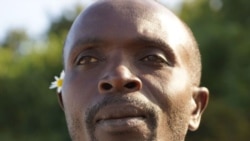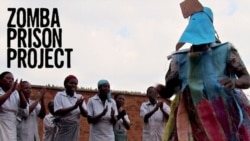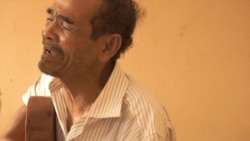Record producer, Ian Brennan, and his wife Marilena Delli, a photographer and documentary filmmaker, are on a quest for the unknown and unfamiliar. Their passion for discovering uniqueness in human stories and music has taken them to far-flung places around the world, from Malawi to record songs by prisoners, to rural Rwanda and Cambodia to give voice to genocide survivors.
Music to his Ears
For a music lover like Ian Brennan, hearing a good song is a rewarding adventure, even if it’s in a language he doesn’t understand. He believes it’s better for us, neurologically and sociologically, to listen to diverse music, which is not what is offered by the commercial music business.
“What we get with the recorded music is by nature repetition, hearing not only the same song, not only the same singer, but the same performance of the same song over and over and over again. But there is a lot more to the world than that.”
Photo Gallery: Unfamiliar Music
The greatest music, Brennan adds, comes from everyday life, from people’s traditions or just their own emotions.
“I think there is so much untapped potential, untapped creativity in the world that to hear from just a small sliver of people is kind of a disservice for everyone.”
Rwandan Experiences
Brennan began exploring that untapped potential about 10 years ago, when he accompanied his wife, who is half Italian, half Rwandan, and her mother, a genocide survivor, to Rwanda.
“My Mom lost all her family,” says Delli. “When we decided to go there, I was shooting a documentary called The Rwanda Mama, about my Mom’s return to Rwanda 30 years apart. She actually discovered that her best friend, who she thought died in the genocide in 1994, was alive and that was the reason why she decided to go back.”
During this trip, the couple had a chance to listen to a local artist, Adrien Kazigira, the lead singer of the Rwandan band, The Good Ones. Brennan went to his farm to record Kazigira’s songs.
“He’s one of the most gifted roots writers, folk writers, I think in any language in the world. But unfortunately, because he sings in Kinyarwanda and not in English, he’s not heard by many people as he probably should be,” Brennan says.
Together, they produced two albums and are working on the third. “Sara,” from the group’s first album, is one of Brennan’s most favorite songs. It’s a love song, he explains, that communicates a variety of complicated emotions. “It’s specifically about a woman who had contracted AIDS and was sent away by her lover and her family and spent the little money that she had to a witch doctor to try to cure herself. And it’s someone who truly loves and cares about her, trying to convince her not to leave, not to be banished.”
Prison Music
In Malawi, Brennan and Delli teamed up again, as they worked on different projects where he recorded the music and she photographed the artists.
“We did Malawi’s Mouse Boys, who have released three albums,” he says. “We also did the Zomba Prison Projects which were with the individuals from the maximum security prison in Malawi, whose first album was surprisingly nominated for a Grammy award, which was something that was deserved, but not expected.”
The couple prefers projects where they work with people who are not identified as musicians, or people who may not have ever sung in public or written songs before.
“That was true of the Zomba Prison Project,” Brennan says. “We worked with over a hundred individuals and produced two albums. Also in Tanzania, when we worked on the Tanzania Albinism Collective (Project). It’s incredible the music that can come forward from someone when they’re given the opportunity to be listened to, and to be heard.”
Different Languages, Similar Experiences
Though in different languages and with different melodies, Brennan says most of these songs convey similar feelings and experiences. Genocide survivors in Cambodia who survived the Khmer Rouge, for example, share some similar experiences with the individuals in Rwanda who survived the three genocides there.
He points to “Defeat the Giant,” by Cambodian artist Soun San, as an example. The song gives voice to genocide victims anywhere.
“Soun San was the master musician from Cambodia,” Brennan says. “He was injured during the Khmer Rouge, but survived. His voice is, I think, an important one and one that I think more people would want to hear. We had set up for him to come to the UK last summer to perform, but unfortunately, between the time he was invited and he got his passport and booked the flight, he fell ill and passed away a month or so before the event.”
For their next project, Brennan and Delli are heading to Pakistan.
“We also have a release coming from Ustad Saami from Karachi, who is a 75-year-old vocal master,” Brennan says. “He sings a lot of pre-Islamic music in Sanskrit, pre-Sanskrit and in Farsi. He’s a very, very gifted and very rare individual because the music that he sings no one else does or really even can.”
Delli is excited about these projects, not only because she loves traveling, but because she believes these projects can make the world a better place. “I just think music is a wonderful way to connect people all over the world and a wonderful instrument to touch people’s heart and overcome hatred and prejudice.”
Having such a calling while discovering the sounds of different cultures and meeting unique artists encourages the couple to keep searching the world for hidden music.




